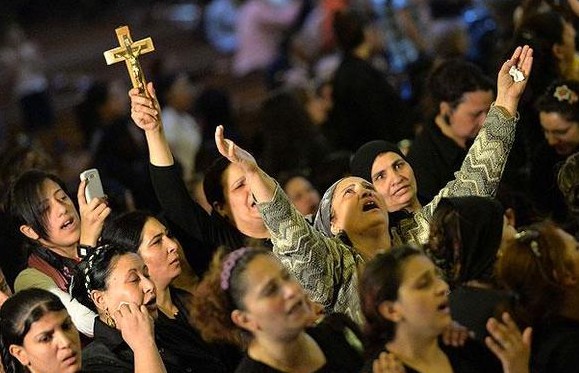Egyptian security services systematically failed to protect Egypt’s Christian minority in the wake of unrest in the country following pro-Morsi demonstrations in August, Amnesty International said Wednesday.
In a detailed report documenting sectarian violence following the ousting of president Mohamed Morsi, the human rights group said that security services failed to prevent a wave of unprecedented attacks on churches, schools and charity buildings.
“In light of previous attacks, particularly since Morsi’s ousting on 3 July, a backlash against Coptic Christians should have been anticipated, yet security forces failed to prevent attacks or intervene to put an end to the violence,” said Hassiba Hadj Sahraoui, Amnesty International’s deputy director for the Middle East and North Africa.
The group said that it was “deeply disturbing” that Coptic Christians were singled out for revenge attacks and condemned security services for failing to prevent incidents which often lasted hours and recurred over subsequent days.
Over 200 Christian-owned properties were attacked and 43 churches seriously damaged in the aftermath of events on Aug. 14.
At least four people were killed, and residents were attacked in their homes.
The body of a 60-year-old Coptic Christian man shot dead in the village of Delga in al-Minya was later dragged through the streets by a tractor, the report said.
After he was buried his grave was dug up twice.
Residents said that mobs armed with metal bars, firearms, and knives ransacked churches and Christian properties and desecrated many historical and religious relics.
Graffiti left scrawled upon walls in the aftermath of the attacks included slogans such as “Morsi is my president” and “They killed our brothers during prayer”.
Amnesty condemned the Muslim Brotherhood for saying “too little, too late” following the attacks, and urged the Islamist movement to condemn its supporters’ actions and refrain from inflammatory language.
The rights group called on Egyptian authorities to conduct an impartial, independent investigation into the violence and take immediate steps to prevent its recurrence.
The group also stressed the importance of developing a comprehensive strategy to fight discrimination against minorities in Egypt, including repealing discriminatory laws and polices.
History of abuse
There is a long history of abuse and discrimination against Coptic Christians in Egypt.
A string of attacks took place under the rule of Hosni Mubarak, the period of military rule following the 2011 revolution, and Muslim Brotherhood president Morsi.
In October 2011, 26 Coptic Christians were killed by armed forces in a crackdown on protesters, and only three low-ranking soldiers have been sentenced to prison terms for manslaughter.
Egyptian authorities have instead favored “reconciliation sessions” to resolve sectarian disputes, which have only consolidated a sense of injustice among minority communities in the country, the report said.
Amnesty urged Egypt to ensure full repatriation and financial compensation to the victims of sectarian attacks, stressing that without concrete measures Coptic Christians would be once again used as an excuse to settle political scores.
Over 1,000 people, mostly Muslim Brotherhood supporters, have been killed by security forces in Egypt following a crackdown on two large pro-Morsi camps in Cairo following the ousting of the Islamist president.
Egyptian security forces have also detained some 2,000 Muslim Brotherhood supporters, including Morsi and several senior leaders.

